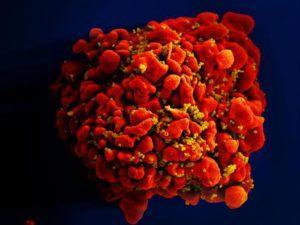
T cell (red) infected with HIV particles (yellow) (Public Health Image Library, NIAID, Image ID:18143)
HIV superinfection provides a platform for investigation into how the immune system responds to various viral strains and therefore can be used to understand what would happen in the event of immunization with different Envelope trimers.
Daniel Sheward from the University of Cape Town presented research at the HIV Research for Prevention Conference describing how they investigated superinfection in a study participant, CAP267, from the CAPRISA cohort in South Africa. CAP267 was infected with at least 2 different HIV strains. Samples taken at 6,10, 20 and 52 weeks from the participant reveal that at all the time points the two strains were detectable. There was no evidence of recombination.
The researchers discovered that there was a level of immunodominance as one viral variant was neutralized more than the other dominant virus. They found that there was no correlation between superinfection and developing broadly neutralizing antibodies.
Looking at another superinfected individual, CAP256 who had broadly neutralizing antibody responses, they found that the breadth was attributed to only one antibody lineage. The epitope for the broadly neutralizing antibody lineage was not found in the primary infecting virus. Superinfection did not promote the recognition of conserved sequences in the different circulating viruses.
For superinfections which did not result in the development of cross-neutralizing antibodies, Sheward described how there were potent autologous neutralizing antibody response to the superinfecting virus but the potency of the autologous response did not correlate with breadth.
Therefore, the researchers concluded that although superinfection can lead to potent antibody response, there is no evidence that superinfection is correlated with neutralization breadth. This data suggests that immunization with multiple antigens such as multiple Envelope trimers may not be able to promote the production of the desired broadly neutralizing antibodies.
Presentation webcast: HIV Research for Prevention 2016 webcasts
Article by Thandeka Moyo











